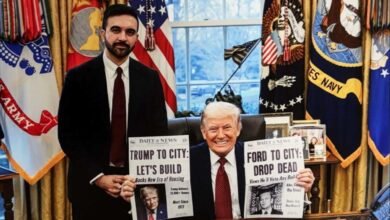LGBT Center’s post-election town hall outlines quest to ‘Trump-proof’ New York – Gay City News
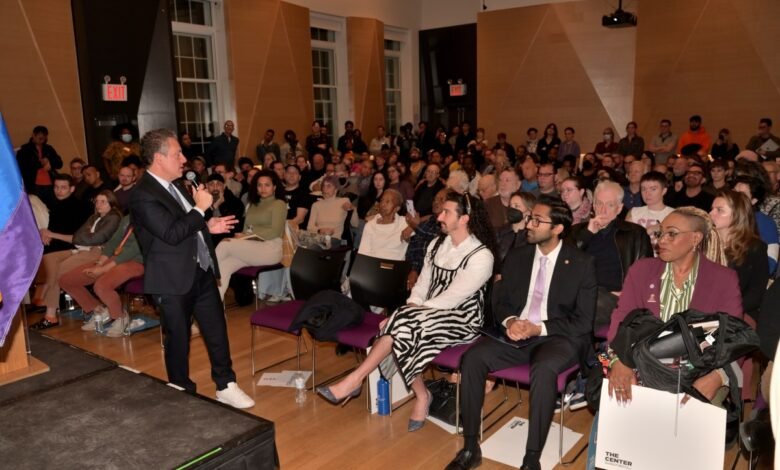
More than 100 attendees — many of them on edge and fearful of the future — crammed into seats and overflow standing room at the LGBT Community Center in Manhattan on Nov. 13 for a crowded post-election town hall to discuss how to protect LGBTQ rights in the face of a hostile Trump administration.
The “Voices Beyond the Vote” town hall event came barely one week after America voted to send Donald Trump back to the White House with a GOP trifecta. The election results prompted widespread concern among community members after many Republican politicians, led by the president-elect, spent the campaign season voicing anti-LGBTQ rhetoric and vowing to roll back the rights of transgender individuals in areas like sports, healthcare, and education.
“The results of last week’s election left many of us with a mix of grief, uncertainty, and fear,” Dr. Carla Smith, the executive director of the LGBT Center, said during an opening address to the audience. “But even in this moment, I want to assure each of you that The Center is here… I want to remind everyone that we do not and cannot achieve our mission alone. As the first lesbian of color to lead the center in its 41-year history, I know how important collaboration and unity are to achieving our goals.”
The event represented the latest example of the LGBT Center’s longstanding role as a queer community hub in critical moments — including bill-signing ceremonies and community organizing meetings. The town hall featured several state lawmakers who delivered remarks about the election and outlined their goals to “Trump-proof” New York.
While many questions from the audience focused on the looming threats at the federal level, the elected officials often redirected the focus of the conversation to New York by outlining ways in which the Empire State can take matters into its own hands.
Still, the town hall coincided with an ongoing stream of breaking news that same day about the president-elect’s outlandish cabinet nods: Florida Congressmember Matt Gaetz was just selected as the next attorney general, while RFK Jr. was tapped to serve as health secretary.
“Today, I found myself screaming at the television set before I got here in between meetings,” said out gay Manhattan Assemblymember Tony Simone, who referred to the president-elect’s picks as “triggering” and “a clown show.”
“I had a flashback to the last time this motherf–er — excuse me, I’ll be in trouble for that — occupied the White House,” Simone said.
He later added: “We can’t react to everything this insane megalomaniac does. We can’t obsess over Twitter and everything that’s going to affect us. We need to organize, not agonize.”
Other out elected officials on hand included State Senator Brad Hoylman-Sigal, also of Manhattan, and Brooklyn State Senator Jabari Brisport. Queens Assemblymember Zohran K. Mamdani, a 2025 New York City mayoral hopeful, also spoke in solidarity with the community.
“When we stand together, we will get through this,” Brisport said. “Now, my part in this as a state legislator: I’m going to push for our legislature to reconvene as soon as possible and pass a full package of pro-LGBTQ+ bills before Donald Trump sets foot in the White House. And throughout the legislative session, I will be making sure we are ready at all points to meet the moment.”
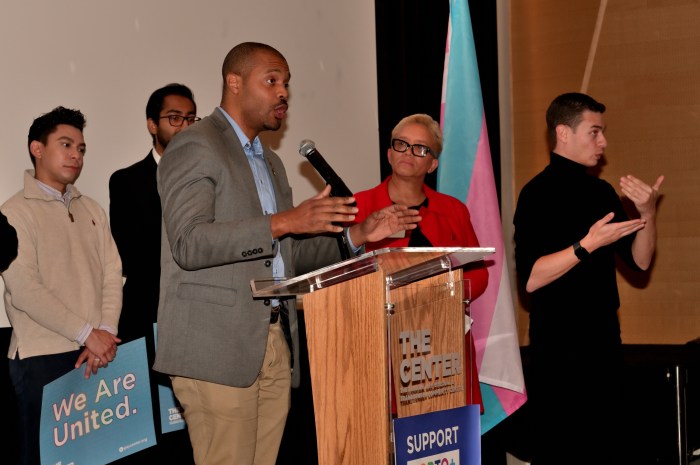
Those comments were echoed by other state lawmakers, including Hoylman-Sigal and Simone, who acknowledged that “it’s going to be a fight” in the days ahead.
The elected officials stressed that the public must not abandon the LGBTQ community due to the election results after Trump repeatedly ran blatantly transphobic advertisements mocking non-binary individuals, trans Americans, and drag artists, among others.
“We didn’t lose the election because of trans kids,” Simone said. “We may have made a mistake without responding to the attack ads on trans kids, but we lost it because of bread and butter issues.”
Questions from the audience touched on areas such as the future of marriage equality, healthcare access, LGBTQ education, and more. Multiple people, including Simone, denounced some House Democrats — namely Tom Suozzi of New York and Seth Moulton of Massachusetts — for their post-election remarks arguing that the party should oppose trans inclusion in sports.
On the issue of education, one audience member asked about the incoming administration’s pledge to shut down the Department of Education.
“The federal US Department of Education doesn’t determine the curriculum for states,” Hoylman-Sigal answered. “But we haven’t done enough in New York. We don’t teach LGBTQ history in our statewide curriculum. We have had a struggle to even teach holocaust history and Black history in our statewide curriculum in New York. It’s taken us years to get this far, so I would say we need to double down in the State of New York and pass a real queer history curriculum for our students so it’s not just tolerance of queer people, but understanding and acceptance.”
There were multiple questions pertaining to healthcare. One audience member asked what New York would do if the Affordable Care Act is repealed. Hoylman-Sigal, in response, called on the state to pass the New York Health Act, which would create a single-player healthcare system. Hoylman-Sigal and Briport are among the co-sponsors of that legislation.
“Let’s make New York the leader in universal healthcare,” Hoylman-Sigal said.
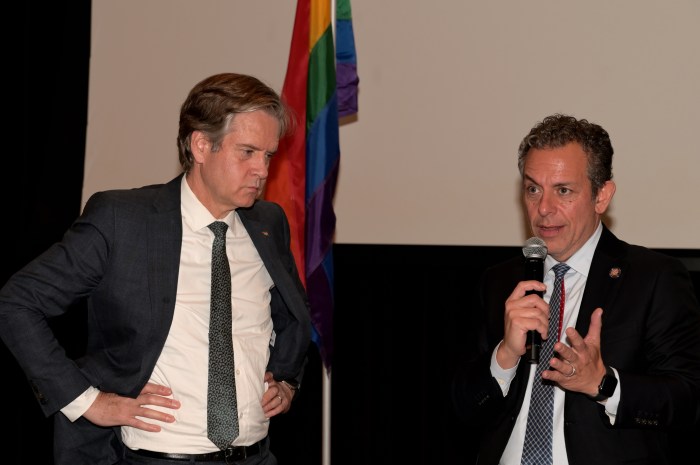
Staying on the topic healthcare, Hoylman-Sigal warned about the potential impact of RFK Jr., a vaccine skeptic who is the president-elect’s pick to lead the Department of Health and Human Services. He has made false claims that vaccines cause autism and also falsely suggested that “there’s plenty of evidence” that HIV originated from a vaccine program. He said “a lot of people” say HIV is “not a virus,” but rather “environmental” and “part of the gay lifestyle.”
Hoylman-Sigal recalled that one of the first bills he passed in the State Senate more than a decade ago pertained to vaccines such as the meningitis vaccine, which was needed in response to an outbreak among gay men in the city.
“RFK Jr. is going to be advising, potentially, on HIV/AIDS policy,” he said. “We’ve doubled down on vaccine protections in the State of New York because we know vaccines work. They’re effective. They protect our HIV-positive community and our kids from vaccine preventable illnesses like measles and COVID-19.”
Speaking about how New York can help shield community members from states led by anti-LGBTQ governments, Hoylman-Sigal pointed to last year’s passage of the Trans Safe Haven Bill, which bars New York State from considering a law from another state directing a child to be removed from their parent or guardian for allowing the child to receive gender-affirming care and bars law enforcement agencies from working with any out-of-state agency or department investigation related to gender-affirming care in New York State.
“So what we can do in healthcare in New York State is continue to protect New Yorkers from vaccine-preventable illnesses, and we also have to continue to make New York a beacon for transition care — transition care that allows parents and physicians to provide that gender affirming care to young people without fear of prosecution.”
Among other topics were marriage equality. Cathy Marino-Thomas, who was an activist during the fight for marriage equality in New York, told audience members to “get your paperwork ready.”
“Dont just leave stuff to your spouse,” Marino-Thomas said. “Leave stuff to your spouse’s name.”
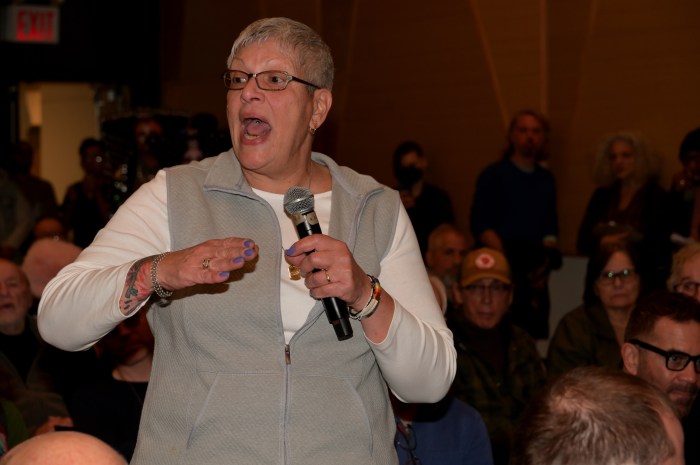
Marino-Thomas, arguing that “the real rights are at the federal level,” asked elected officials about the strength of the Respect for Marriage Act — a federal law passed by Congress and signed by President Joe Biden after the 2022 midterm elections and just weeks before the the GOP assumed control of the House of Representatives.
Marriage equality was legalized nationally by the Supreme Court in 2015, but if the nation’s highest court goes after marriage equality like it did with abortion rights, the Respect for Marriage Act would at least require the federal government to recognize marriages performed in states where marriage equality is the law of the land. New York State has had marriage equality since 2011.
In response, Simone conceded that he didn’t know the answer to the question, but said “the fear we have is the Supreme Court.” The Supreme Court is dominated by conservative justices, including two — Samuel Alito and Clarence Thomas — who have cast doubt on the legality of nationwide marriage equality.
Hoylman-Sigal offered a different response, pointing to the protections delivered by the passage of Proposal 1 in New York State this past election day, which amended the State Constitution to shield against discrimination on the basis of pregnancy, sexual orientation, gender identity, and more.
“Not only do we have marriage codified — we now have it in our state constitution, which is good as you’re going to get at the state level,” Hoylman-Sigal said. “Yes, there could be an opening and we’ve heard Trump talk about ‘leave it to the states’ that returns marriage rights for queer people to the states. That’s going to be a huge problem for families, for children, parents, and for our loved ones. There is no question that the supremacy clause of the US Constitution is going to be our biggest challenge over the next four years.”
In June of 2015, Trump told Fox News he supported “traditional marriage” and would have “preferred states, you know, make the decision.”
On issue after issue, the town hall discussion returned to the responsibility of New York State to uphold the values of the people who live here and to protect LGBTQ folks. Attendees, too, were particularly interested in hearing about the state’s role in defending against the incoming administration.
While town hall attendees shared their disdain for President-elect Trump, there were some attendees who said they did not vote for Vice President Kamala Harris, who was the Democratic nominee. One attendee, who identified only as Corazon and sat in the middle of the crowd, was attending the LGBT Center for the first time.
“I wasn’t rooting for Republicans or Democrats, and I wasn’t sold on any third-party people,” Corazon told Gay City News at the conclusion of the town hall. “So the outcome of the election — it sucks, it’s horrible. But on election day itself, I felt, this is another day. This is the second time we’ve been through this. We’re already under an administration that says it cares about the LGBTQ+ community, but we know it doesn’t, even if it is passing all these so-called laws that protect us, there is still a lot of pain, a lot of suffering.”
Despite a lingering sense of shock from the election, Smith and the elected officials sought to motivate a crowd that was pleading for answers about how to move forward.
“We have to work together,” Hoylman-Sigal said. “It’s a lot of work for us to do, but as a community, I think we will come back stronger. I do believe that, because we’ve been in this room before with great challenges before us, and of course, we have now one before us today.”
Source link


